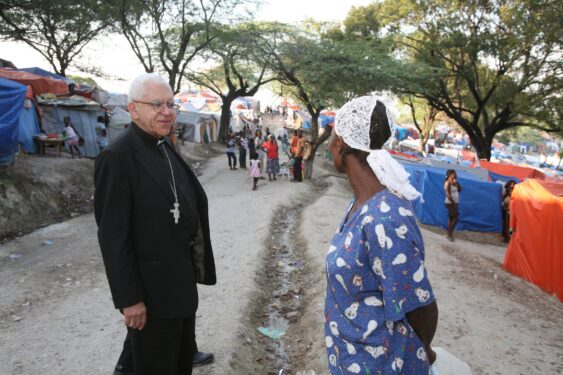
WINDSOR TERRACE — Right up to the end of his life, retired Auxiliary Bishop Guy Sansaricq was busy working on behalf of the Haitian community.
In his final days, the Haitian-born bishop, who died Aug. 21 at age 86, was organizing a drive to get churches rebuilt after the recent earthquake in Haiti. He had met with Archbishop Max Leroy Mesidor, the archbishop of Port-au-Prince, to discuss the next steps.
“He loved his people,” said Lilas Sylvain, who knew Bishop Sansaricq for 25 years, dating back to his days as parochial vicar for Sacred Heart Church, Cambria Heights. “He was always there fighting for the community to make sure the community was treated with respect.”
The 7.2-magnitude quake that hit Haiti on Aug. 14 was a big personal blow to the auxiliary bishop, Sylvain said.
“I think it was too much, emotionally, for him. I think the earthquake broke his heart,” she said.
Bishop Sansaricq’s heart was always with his fellow Haitians, according to Catholics who knew him. During his time at Sacred Heart (1971-1993), he was appointed coordinator for the Haitian Apostolate for the Diocese of Brooklyn — a role that saw him become the leader of Haitian Catholics here.
“He was a unifying figure to Haitians. His goal was to have Haitians come together and work together. It was mostly immigration, but he worked on other issues too,” said Carlens Bruni, who knew the bishop from St. Jerome Church, Flatbush, where he served as pastor from 1993 to 2007.
Nancy Milien, who met him at Sacred Heart, admired him greatly. “He did a lot. He really did. He was the kindest person. He had the most patience. And the way he loved people and the way he loved his community was beyond words,” she said.
In the 1970s, Bishop Sansaricq founded an organization called the National Center of the Haitian Apostolate to bring Haitian-Americans closer to the faith and to serve their needs — everything from immigration issues to job placement.
“It was a hard time. There was a lot of trouble in Haiti and some priests were expelled,” said Monsignor Pierre Andre Pierre, the center’s vice director. “He welcomed them. He is an icon to Haitian priests.”
In 1987, the U.S. Conference of Catholic Bishops elected Bishop Sansaricq to head the National Haitian Apostolate.
His efforts also included ensuring that churches with large Haitian populations celebrated Masses in French and Haitian-Creole “so that people could be grounded to the Liturgy in their own language,” Msgr. Pierre said.
Bishop Sansaricq wanted to instill pride in Haitians, Msgr. Pierre said. To that end, he established a pastoral institute where courses were conducted in Creole and published a newsletter on church issues related to Haiti.
The well-respected cleric was considered the “go-to” person for all things Haiti in the U.S. But he was also a priest at heart. “He helped people with immigration problems but he also took time to talk to people about their family problems. He gave good advice,” Bruni said.
“Bishop Sansaricq was a good guy. He was humble,” said Benedict LaMartine, a friend from the St. Jerome days. “You could talk to him about anything,”
